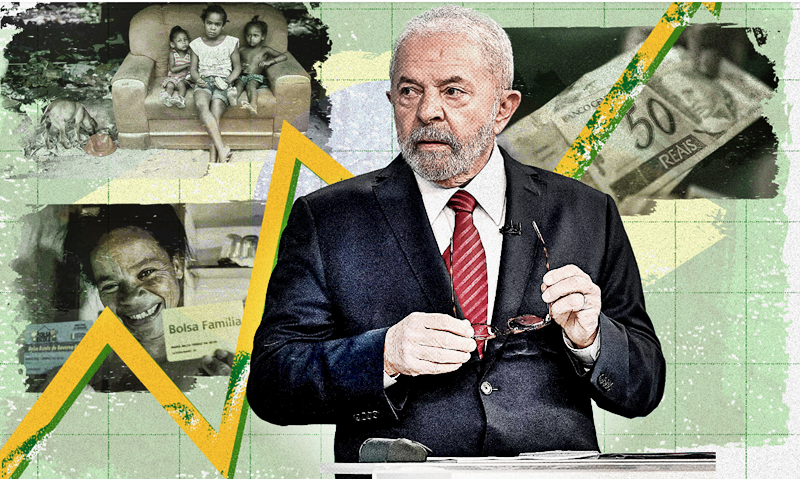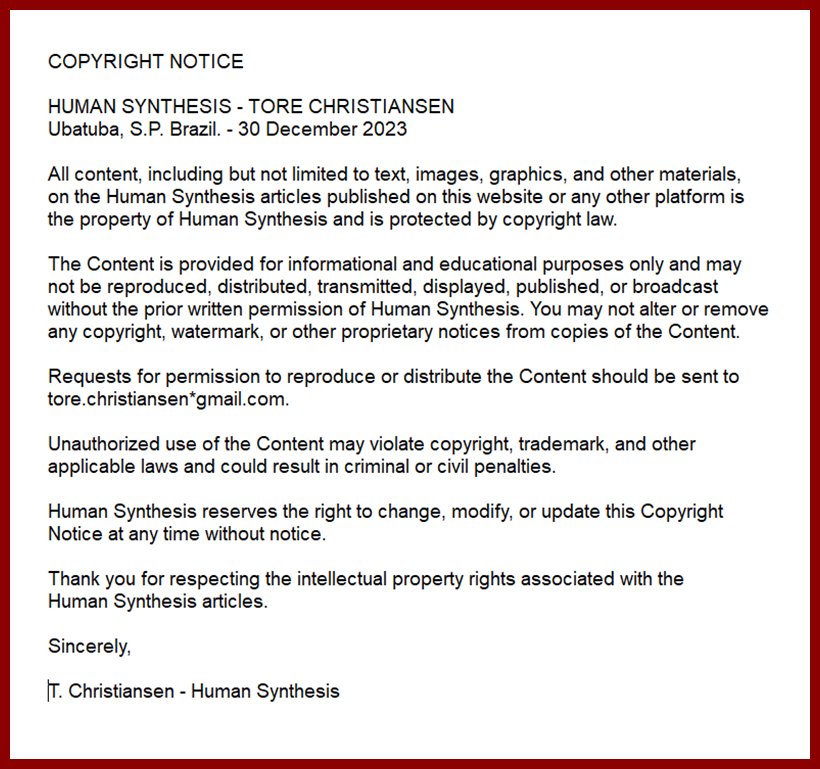Massive Tax Changes in Brazil Set to Roil Consumers Already Struggling

By EpocTimes - Autumn Spredemann|June 18, 2024.
Complaints about Brazil’s confusing tax system have spanned decades and multiple administrations. While officials say they’re streamlining the country’s notoriously complex tax system, some say a high VAT will hurt low-income households.
The latest reforms were passed in December 2023 after nearly five years of debate. They include a value-added tax (VAT) of up to 27.5 percent that will put Brazil alongside Hungary and Sweden as countries with the highest consumption tax rates in the world.
The United States doesn’t have a VAT, but states have a sales and use tax that varies between 0 and 9.5 percent.
Brazil’s VAT tax will begin to be phased in by 2026 and is currently anticipated to take full effect over a seven year period.
The move has drawn mixed reactions from Brazilians, including criticism that a high VAT will deal a harsh blow to the country’s low income earners. Standard VAT rates of around 20 percent aren’t uncommon in European countries, but those nations don’t have the same level of poverty as Brazil.
Since leftist President Luiz Inácio Lula da Silva took office in January 2023, his administration has struggled to address inflation and high unemployment, while the poverty rate sits near 30 percent.ADVERTISEMENTAmong the new tax reform’s critics is Brazilian Sen. Rogerio Marinho, who said, “We are going to offer Brazil the highest value-added tax in the world.”
Brazil’s current levy aims to consolidate five different consumption taxes into a single VAT to “promote greater efficiency and sectoral isonomy,” according to the Policy Center for the New South.
Lula’s Brazil: A Cautionary Tale for Free Speech in the WestBrazil Is Calling. Is Anyone Listening?Neither Party Dealing With ‘Devastating’ National Debt, Tax Reform Advocate SaysSupporters of the reform maintain the VAT won’t directly impact Brazilian taxpayers, but experts argue those struggling financially will take a hit regardless.
“It’s clear that Brazil missed a great opportunity to reduce its percentage of tax collection on productive activity, which [will] cause several negative economic consequences,” Paulo Ricardo Alecrim told The Epoch Times.
Mr. Alecrim, a Brazilian tax attorney and a partner at Alecrim & Costa Advogados, says some of the adverse effects of the current reform include increased consumer prices, a chilling effect on consumption, loss of international competitiveness, and a disproportionate impact on the economically vulnerable.
“Low-income consumers are more affected by a high VAT since they spend a higher proportion of their income on goods and services subject to the tax,” he said.
Impact on Poverty
Mr. Alecrim is far from alone in his concerns over the VAT’s effects on those who are struggling financially. Leading World Bank economist for Brazil Shireen Mahdi also highlighted this point.
She observed that while the VAT has the potential to change the Brazilian tax system for the better, the outcome may diminish families’ purchasing power.
Further, she asserts reducing the standard VAT rate in education and health care could mean no reduction in indirect taxes at the individual level. Both of these sectors comprise a sizable portion of consumption for low-income families.

A supporter of Brazilian presidential candidate Luiz Inacio Lula da Silva hangs a flag with a photo of the candidate on her street stall during the presidential run-off election, in Rio de Janeiro, Brazil, on Oct. 30, 2022. Since President Lula took office, his administration has been struggled to address inflation and high unemployment. (Mauro Pimentel/AFP via Getty Images)Amid sluggish economic growth in 2024, the cost of necessities such as food have also become more expensive.

Between 2007 and 2023, Brazil’s Food and Beverage Price Index increased 216 percent, according to the Instituto Fome Zero. This far surpassed the Broad Consumer Price Index growth rate of 132 percent over the same period.So far this year, Brazil’s Broad Consumer Price Index saw a 3.59 percent increase in food and drinks, a 3.1 percent rise in health and personal care items, and a 5.5 percent spike in education costs.
The potential indirect impacts from the VAT also weigh heavily on some Brazilians.
Juliana Santos works as a secondary school teacher in the western city of Rio Branco. He worries how the new VAT rate will impact the already struggling education sector.
“They act like these changes won’t affect most people because it’s not an income tax,” she told The Epoch Times.
“Education already comes with expenses many Brazilians struggle to pay. Transportation, items for class, and more. If families pay more in other areas, sending children to school will become harder.”
Currently, more than 21 million families use government welfare subsidies under the Bolsa Familia program. Started in 2003 by President Lula during his first term, the program offers money to qualifying low income households that are willing to send their children to school and get vaccinations. The average monthly per household payout is R686 ($127 USD).Public schools in Brazil are free, but complaints of underfunding and a lack of quality in education are widespread. Evidence of this can be seen in the dismal completion rates for public school attendees.
Official numbers from a 2020 report observed more than half of Brazilian adults age 25 or older never completed secondary school. This trend is especially prevalent in the Northeast, where three out of every five adults never finished high school.The same analysis also showed that the transition from primary to secondary education is where the dropout rates increase, with the percentage of young people withdrawing from school nearly doubling at the age of 15.

Students leave school after eating lunch at Municipal Burle Marx School in Rio de Janeiro, Brazil, on April 4, 2024. A 2020 report showed that 60 percent of Brazilian adults aged 25 or older never completed secondary school. (Pablo Porciuncula/AFP via Getty Images)Child Fund Brazil underscores this point, noting the problem is worse for rural populations. “Often due to a lack of structure or public policies, even getting to school can be a problem,” the organization states on its website.
“This isn’t the first time the government has tried changing Brazil’s taxes. The end result is always the same,” Ms. Santos said—it “never seems to help the poor.”
A United Nations Development Programme report also touched on the ineffectiveness of previous Brazilian attempts to implement a VAT.
“Since redemocratization, several reforms have made their way through the National Congress calling for a modern value-added tax (VAT) system to replace outdated and inefficient taxes,” the report states.
“However, none has been politically successful, either because of conflicts within the federal government over revenue redistribution or because of opposition from social and congressional interest groups.”
Exemption Challenges
Mr. Alecrim said service providers will be most affected by the VAT reform. Presently, companies pay a maximum tax rate of 5 percent.
“These types of companies typically have expenses that don’t necessarily depend on a production chain, where one can obtain a discount through the deduction of tax already paid in previous stages, since the Brazilian VAT will be non-cumulative,” he said.
Additionally, Mr. Alecrim noted that while there’s concern over an increased tax burden on consumption, the consolidated VAT has a built in cap.
“The text of the tax reform provides a lock for the collection of consumption taxes, meaning a limit that cannot be exceeded,” he said. “Thus, the new Brazilian VAT cannot have a tax burden higher than the currently existing one.”
That means the VAT can’t be more than the existing total of consolidated taxes.
But that doesn’t guarantee a lower tax burden either. Generally, high VAT rates can be harmful to new and marginal business activities, create administrative complexities, drive inflation, and undermine export incentives, according to an analysis conducted by the U.S.-based Tax Foundation.

People walk at Saara market in downtown Rio de Janeiro, Brazil, on Dec. 8, 2020. The country's poverty rate is at 27 percent. (Mauro Pimentel/AFP via Getty Images)
However, if managed correctly, some of the claimed benefits of a VAT include incentives for businesses to control costs and to provide a stable revenue base.
Though using a VAT to create a stable revenue base may be counterintuitive since evidence shows high VATs have encouraged tax evasion in countries that also struggle with income inequality, such as Morocco.
One report noted that 80 percent of Morocco’s VAT is paid by just 1.6 percent of companies due to tax evasion, while only 46 percent of companies submit a corporate tax return. Within this group, 33 percent demonstrate taxable profits.
Analysts anticipate similar challenges in Brazil.
“Great effort is needed to battle private interests and detrimental lobbies that seek to claim exemptions from the headline VAT rate,” stated the Morocco-based Policy Center for the New South.
“This includes inhibiting further changes to the already extensive list of sectors receiving preferential treatment.”
Mr. Alecrim said industries hoping to avoid the new VAT through exemption could be a challenge for Brazil. “As a rule, the granting of tax benefits [or] subsidies will be prohibited. However, some sectors and products will have differentiated tax treatment.”
He said there will be VAT exemptions for goods and services like medical devices, medicines, some food products, cars acquired by people with qualifying disabilities, and professional drivers.
“Tax incentives in the Manaus Free Trade Zone will also be preserved, which will be the only region in the country authorized to have tax, financial, and economic subsidies,” he said.
Maintaining tax incentives through the government-mandated Free Trade Areas is critical for Manaus, which is a key manufacturing hub and the state’s main supplier of jobs due to the undeveloped remoteness of Amazonas.Brazilian legislators are now eyeing additional reforms to personal income and corporate taxes.
“Issues such as the revocation of the exemption from income tax on dividends paid to shareholders are already being discussed in the National Congress,” Mr. Alecrim said.
